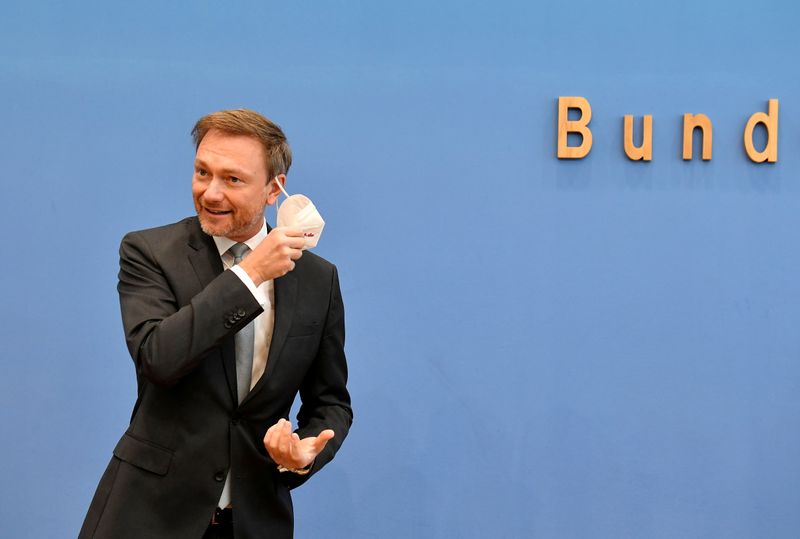By Christian Kraemer and Paul Carrel
BERLIN (Reuters) - Germany's pro-business Free Democrats, emerging as a pivotal force ahead of September elections, worry that declining support for Chancellor Angela Merkel's Christian Democrats could scupper their chances of joining up to keep the centre-right in power.
An internal Free Democrats (FDP) analysis reveals that the party privately considers the CDU's slide in two state elections last weekend as a potential "catastrophe" for the centre-right camp, even as the FDP publicly celebrates its own resurgence.
The document, obtained by Reuters, describes Merkel's Christian Democrats (CDU) and their Bavarian sister party, the Christian Social Union (CSU), as a "powder keg" ready to explode over their handling of the coronavirus pandemic.
The CDU/CSU alliance, known as the Union, benefited early in the pandemic from a "rally round the flag" effect, the FDP said, as voters backed Merkel in a time of crisis. A "halo" effect saw her popularity spread across her party, but this had evaporated.
"Confidence in good governance has been met with serious management failures in government," the FDP document read, citing problems with the rollout of COVID-19 vaccines, test kits and bridging grants.
The report is significant because the FDP, which is led by the 42-year-old Christian Lindner and has been emboldened by gains in a regional vote last Sunday, are potential kingmakers in a national government after September's federal elections.
LEFT-WING COALITION?
The CDU slumped to record defeats in two state votes on Sunday after its muddled pandemic response, setting back its prospects at the federal elections, which they will face without Merkel, who is standing down after holding power since 2005.
The CDU's slump gives the FDP no grounds for celebration, the analysis read, as it opens up the risk of a left-wing coalition of the ecologist Greens, the Social Democrats (SPD) and the far-left Linke taking power after the September vote.
"This would be a political catastrophe in view of the challenges facing Germany," the analysis said.
The FDP has been strongly critical of the ruling CDU/CSU alliance over its handling of the pandemic and for what it says is a violation of civil liberties from lockdown measures.
In the southwestern automotive hub of Baden-Wuerttemberg, the FDP increased its share of the vote in Sunday's state election to 10.5% from 8.3% in the previous poll in 2016.
The gains opened the way for a potential regional alliance of the Greens, SPD and FDP, dubbed a 'traffic light' coalition after the parties' colours. Before Sunday's vote, the Greens had ruled in coalition with Merkel's party.
Agreement on a traffic light coalition in Baden-Wuerttemberg would bolster the chances of the same parties seeking a national coalition in September, a scenario that would cast Merkel's conservatives into opposition for the first time since 2005.
The FDP would not be drawn earlier this week on its potential as kingmaker in a national government.
The CDU/CSU would like to join forces with the FDP, though polls show that such a combination would now lack sufficient voter support to form a government.
Another option would be a three-way alliance of the CDU/CSU, Greens and FDP, though the FDP walked away from coalition talks over that formation after the 2017 federal election.
In its analysis, the FDP called for more transparency in politics after a scandal emerged over face mask procurement deals involving CDU/CSU lawmakers.

The Union's decline risks "a political vacuum, into which destructive forces take root," it said.